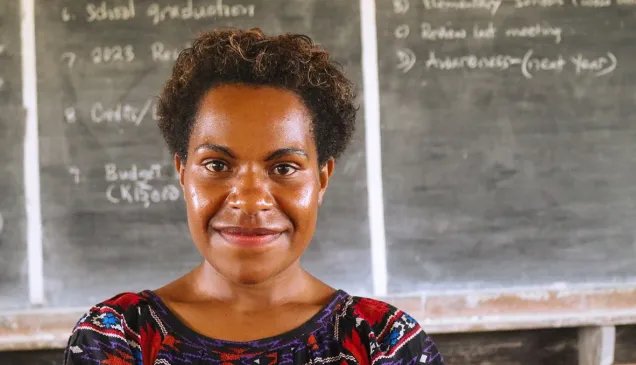Almost half of all millennials think it is more likely than not there will be a third world war in their lifetime, a new Red Cross survey finds.
That's the result of a global survey of 16,000 millennials on their attitudes to war, conducted by the International Committee of the Red Cross (ICRC). An Australian Red Cross survey conducted in parallel found war and climate change top Australians' list of global concerns.
Yvette Zegenhagen, head of International Humanitarian Law at Australian Red Cross, said it was revealing that Australians of all ages think that the most important issues faced by the world are war and climate change; more critical than unemployment, health care and terrorism.
The ICRC Millennials on War report is a snapshot of the top concerns of millennials surveyed in 16 countries and territories at peace and at war around the world. Seven countries surveyed were experiencing armed conflict, including Syria, Afghanistan, Nigeria and Colombia. Nine peacetime countries surveyed included the United States, United Kingdom and France.
"Our global survey reveals that millennials are nervous about their future and see cataclysmic war as a real likelihood in their lifetime," said Yves Daccord, director-general of the ICRC. "It is very concerning that almost half of all millennials think it's more likely than not that there will be a third world war in their lifetime."
An overwhelming number of Australians surveyed also said that there is a need to impose limits on the way wars are fought, suggesting strong support for the values which help the Red Cross around the world to protect and assist victims of war and armed violence.
Zegenhagen said it was heartening that more than three in five Australians believe that the laws of war, underpinned by the Geneva Conventions, reduce suffering in armed conflicts.
"The global results show that the majority (54 per cent) of millennials think that the Geneva Conventions reduce suffering in war. Our survey results also confirm that Australians demonstrate even greater commitment to these values, with three out of five (59 per cent) millennials believing that the laws of war make a difference and reduce suffering," she said.
The survey does, however, reveal a worrying trend that points to a lack of respect for some aspects of the laws of war, with the survey finding that more than one in four Australians (27 per cent) believe that torturing an enemy soldier for information is acceptable despite torture being illegal under international law.
"It's reassuring that most Australians think it's never acceptable to torture Australian or enemy soldiers and that Australia scores lowest among all 17 countries in finding torture acceptable," Zegenhagen said. "However, it is alarming to find that more Australians believe it is acceptable to torture enemy soldiers than when we asked this question three years ago."
Overall, according to Daccord, millennials living in countries at war hope for a brighter future and are willing to stand up for humanity, with three out of four people (74 per cent) aged 20 to 35 thinking that most wars could be avoided.
"Millennials and youth are fighters in current and future conflicts. The future is in their hands," Daccord said. "It is vital for us to reinforce their belief in the norms of humanity and to encourage values which help us to protect and assist victims of war and armed violence."
For more information contact:
Susan Cullinan, Media Adviser, Australian Red Cross:
0448 326 335 or scullinan@redcross.org.au
Pat Griffiths, Communications Officer, ICRC Australia Mission:
0418 485 120 or pgriffiths@icrc.org
Additional key findings:
- The most important issues facing the world today according to all Australians: War and armed conflict (57 per cent), followed by climate change (55 per cent), terrorism (54 per cent), increasing poverty (52 per cent) and poor health care (50 per cent).
- The most important issues facing the world today according to Australian millennials: Climate change (60 per cent), unemployment (51 per cent), poor health care (48 per cent) increasing poverty (45 per cent), war and armed conflicts (45 per cent).
- The most important issues facing the world today according to millennials globally: Corruption (54 per cent), unemployment (52 per cent), increasing poverty (47 per cent), terrorism (47 per cent), war and armed conflict (45 per cent).
- Nearly one in three (29 per cent) Australians of all ages as well as millennials believe that autonomous weapons and drones – those not controlled by humans – will increase the number of civilian casualties in war; whereas one in five Australians (20 per cent) compared with nearly one in four millennials (23 per cent) believe that if autonomous weapons and drones replace human combatants in the future, it will lower the number of civilian casualties in war.
- Nearly one in three (30 per cent) Australian millennials believe that climate change is making war and conflicts more likely compared with one in four (25 per cent) of all Australians, with less than one in 30 people (3 per cent) thinking climate change is making wars and armed conflicts less likely and nearly one in two (47 per cent) believing that climate change is making no difference to wars and armed conflicts.
Further global millennials on war survey findings
- More than one in three (36 per cent) of millennials believe that autonomous drones and robots – those not controlled by humans – will increase the number of civilian casualties in wars and armed conflict; whereas less than one in three (32 per cent) say it would lower the number of civilian casualties and one in four (24 per cent) think it would make no difference.
- Overall, close to three out of four (73 per cent) millennials say that addressing mental health needs of victims of conflict is just as important as addressing physical medical needs. The highest response came from Syria (87 per cent) compared with the lowest in France (63 per cent).
- Globally, a majority (54 per cent) of millennials believe torturing an enemy combatant is never acceptable
- Three-in-four (74 per cent) think that 70 years after the creation of the Geneva Conventions, there remains a need to impose limits on the ways wars can be fought.
Survey methodology
The Australian survey: An Ipsos online omnibus with an Australia nationally representative sample of 1,042 interviews, including 319 millennials aged 18-35 years, was conducted between 16 and 20 October 2019.
The global Millennials on War survey was commissioned by the ICRC and carried out by Ipsos. Between 1 June and 7 October 2019, Ipsos conducted the survey using a mixed method design; 16,288 interviews were completed amongst adults aged 20 to 35 living in the following 16 countries: Afghanistan, Colombia, Israel, Palestine, Nigeria, Syria, Ukraine, France, Indonesia, Malaysia, Mexico, Russia, South Africa, Switzerland, United Kingdom and United States. Quotas were set on age, gender, region and type of settlement in order to ensure that the sample represents the millennials' population structures well by these variables in respective countries.



